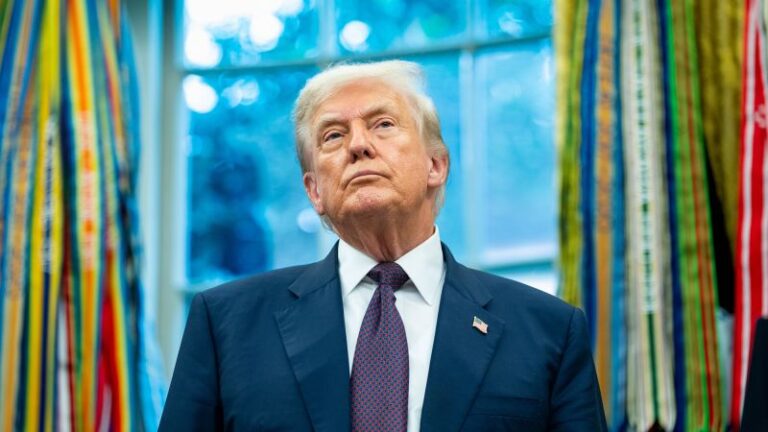President Donald Trump has remade the global trading system. He’s just getting started.
Trump’s “reciprocal” tariff regime went into effect just after midnight, solidifying the new world order fueled Trump’s long-standing – and oft-doubted – aspiration to reorient seven decades of global commerce.
But the days leading up to this moment provide a window into a president who advisers tell CNN is increasingly emboldened, confident and unyielding in his belief that his unprecedented use of tariffs for, well, just about everything, hasn’t carried any downside.
It’s a view corporate executives, foreign leaders and a veritable phonebook worth of economists would hotly dispute, citing an array of warning signs in underlying economic data, earnings calls and geopolitical maneuvering. Trump is unbowed and set to aggressively expand his imprint on a new global system of trade in the weeks ahead.
“Tariffs are his Swiss Army Knife – there’s isn’t a single thing that cross his desk that can’t be solved by their utility,” a senior administration official told CNN. “I think the experience of the last few months has proven that approach correct – and probably made the Swiss Army Knife more of a Swiss Army chainsaw.”
Trump’s reciprocal tariffs are now in place, as are tariff-laden bilateral trade frameworks with countries that make up roughly 60% of the world’s gross domestic product. Steel, aluminum, copper, auto and auto parts sector tariffs are active as well. Soaring sector-based levies on semiconductors, pharmaceuticals, lumber, critical minerals, aircraft, poliysilicon and trucks are in process and will be rolled out in the coming weeks. The exact dates appear almost entirely up to Trump and his trade teams. The actual rates for those sector tariffs? Same, but by all accounts, only moving upward by the week with Trump recently setting the level for chips and semiconductors at “approximately 100%” and threatening up to 250% for pharmaceuticals.
The official was relaying the observation about Trump’s all-purpose use of tariffs on steroids at roughly the same time the Swiss president, who had scrambled to Washington in a last-ditch effort to avoid Trump’s soaring new tariff rate on her country, was departing the capital Wednesday without a deal in hand. It was a rather colorful – if telling – coincidence.
World leaders and their trade teams scrambled to cut deals to ease new rates, only to be rebuffed. Business leaders or their highly-paid Washington sherpas insisted there were clear opportunities to secure exemptions and carveouts but have discovered there would be no easy path.
“Trump is always listening, always taking offers,” one lobbyist. “But yesterday’s price is not today’s price based on my sense of things – he wants big numbers, big commitments, big demonstrations of success.”
Hundreds of billions of dollars in corporate pledges and investment commitments have served as Trump’s most coveted elements of bilateral trade framework, officials say. Trump has specifically cited those commitments as a way countries could “pay down” the threatened tariff rates. Trump’s advisers have formulated plans to utilize those commitments to shore up US supply chain weaknesses and vulnerabilities. The structure, while still very much a work in progress and subject to some dispute between the US and counterparts, serves as an innovative and certainly unprecedented vehicle to address national security concerns in critical industries and products, officials say.
Trump’s view of the investment commitments is framed in a somewhat different manner.
“If you look at Japan, we’re taking in $550 billion, and that’s like a signing bonus that a baseball player would get. They give a signing bonus of a million dollars, or $2 million or $20 million, or whatever the hell they give today,” Trump said this week on CNBC. “So I got a signing bonus from Japan of $550 billion. That’s our money. It’s our money to invest, as we like.”
In other words, Trump wants exactly what Apple CEO Tim Cook provided in the Oval Office on Wednesday with the announcement of a new commitment to invest $100 billion in US jobs and suppliers. The customized glass and 24-karat gold statuette that Cook theatrically unveiled in the middle of the announcement didn’t hurt either.
Trump, just hours before he and Cook appeared together in the Oval Office, slapped 25% tariffs on India for their purchases of Russian energy. That levy, should it go into effect in three weeks, would raise US tariffs on all imports from India to 50% – one of the highest levels world-wide. The underlying reason for Trump’s escalation, despite the predicate of depriving Putin’s war machine of critical cashflow, was India’s refusal to drop nearly all of its tariffs to US producers, multiple officials told CNN.
Punishing tariffs on India, where Apple has a significant manufacturing footprint, would seem to be a major problem for a CEO like Cook.
But White House officials made clear that in the near term, existing exemptions on specific technology products meant Apple wouldn’t take a hit in the near term.
Trump, in an unexpected announcement during the event, made clear those exemptions would stand for the long term, too.
“We’re going to be putting a very large tariff on chips and semiconductors, but the good news for companies like Apple is, if you’re building in the United States, or have committed to build, without question, committed to build in the United States, there will be no charge,” Trump said.
There are no shortage of questions about the final shape of the trillions in investment commitments outlined in corporate pledges and the trade frameworks with foreign counterparts. There is significant technical and legal work ahead on the bilateral frameworks, which were in many cases revised and reshaped by Trump’s own hand in Oval Office sit downs and are now subject to some dispute in foreign capitals.
But Trump’s advisers hardly seem concerned about their ability to finalize the terms in the months ahead.
“The method to hold countries and the companies in these countries to their commitments is, of course, the tariffs,” the senior administration official said.


